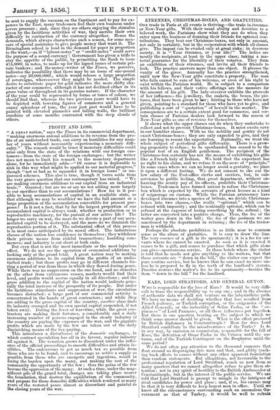ETRENNES, CHRISTMAS-BOXES, AND GRATUITIES. ONE trade in Paris at all
events is thriving—the trade in etrennes or New-Year gifts. With their usual ability and devotion to a beloved work, the Parisians show what they can do when they enter upon the business of dunning their friends for optional con- tributions. They beat our Christmas-boxes, not only in amount, not only in certainty, but in the 000peration with which all classes give. The impost can be evaded only at great risks ; in decorous society, it is ' Your etrennes, or your life i " The ladies are mostly the recipients, at least in the upper class; taking a ma- terial guarantee for the liberality of their votaries. They form an exhibition of their etrennes, and invite all their friends to look. The practice answers more than one object. It pleases the vanity of the giver. Annually has the practice strengthened, until now the New-Year gifts constitute a property. The man who fails cannot be sure of his welcome, or even of his right to exist within the Parisian world. He is subject to a comparison with his fellows, and their votive offerings are the measure for the amount of his gift. The lady-receiver exhibits the proceeds of her influence—the jewellery, the caskets, the boxes, the pic- tures, that have been given to her ; hinting to those who have not given, pointing to a standard for those who have yet to give, and publishing a sort of "quotation" of herself in the market. The consequences are to a certain extent good for commerce, and cer- tain classes of Parisian dealers look forward to the season of New-Year gifts as one of revenue for themselves.
It shows what the upper classes can do when they undertake to collect and not to prevent Christmas-boxes. It must excite envy in our humbler classes. With us the nobility and gentry do not exact Christmas-boxes ; they are only expected to give, and they are learning to resent the expectation. Nationally, we treat the whole subject of periodical gifts differently. There is a grow- ing propensity to refuse ; to be openhanded has ceased to be the popular test of an English gentleman. The recipient of the Christmas-box certainly has not the means of exhibiting his gifts like a French lady of fashion. We hold that the expectant has no right to his claim, and we refuse it on the score of " principle." In some cases where we can no longer avoid a gratuity, we place it upon a different footing. We do not consent to eke out the low salary of the Post-office clerks and carriers, but, in sub- servience to public feeling, that great department, without en- hancing the scanty pay of its officers, prohibits their Christmas- boxes. Tradesmen have formed unions to refuse the Christmas- box which is expected by the servants of great houses as a kind of seignorage on custom. While the Parisian aristocracy have developed etrennes into a species of tribute, we divide Christmas- boxes into two classes,—the really "optional," which can be refused with impunity ; and the nominally optional, which can be refused at the expense of losing something by the refusal ; the latter are converted into a positive charge. Thus, the fee of the waiter goes down in the bill ; the fee of the postman we are sanctioned by the department in refusing ; the fee of the trades- man is withheld.
Perhaps the absolute prohibition is as little near to common sense as the abuse of gratuities. It is easy to draw the line. The very essence of a gift is its spontaneity ; it is a fee for ser- vants where fee cannot be exacted. As soon as it is exacted it ceases to be a gift, and ceases to purchase that which gifts alone can give—spontaneous service. In those hotels whore the visitor is told that he needs not give anything to the waiters, but that those servants are " down in the bill,' the visitor can expect the pure routine service, but he knows that he can exact no more un- less he is prepared io fly in the teeth of the landlord's statute. Practice restores the waiter's fee to its spontaneity—besides the item " down in the bill " for the landlord.










































 Previous page
Previous page